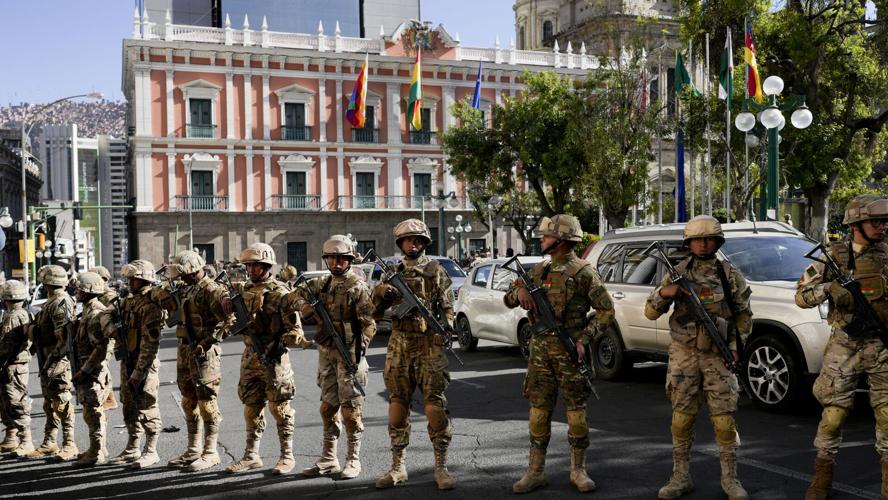Bolivian soldiers storm presidential palace in failed coup attempt
Bolivian soldiers used an armoured troop carrier to smash their way into the presidential palace on Wednesday in an apparent attempted coup.
After battering down the vast wooden doors, heavily-armed soldiers surged into the building in the centre of the capital La Paz.
Inside, President Luis Arce confronted the army’s former top officer, Juan José Zúñiga, who appeared to be leading the rebellion, and told him: “I am your captain, and I order you to withdraw your soldiers. I will not allow this insubordination.”
Hours later, Bolivian authorities arrested General Zuniga and took him into police custody, according to reports.
However, shortly before his arrest, General Zúñiga claimed Mr Arce asked him to storm the palace in a political move.
“The president told me: ‘The situation is very screwed up, very critical. It is necessary to prepare something to raise my popularity’,” General Zúñiga told reporters.
General Zúñiga said he asked Mr Arce if he should “take out the armoured vehicles?” and Mr Arce replied, “Take them out.”
Bolivian president Luis Arce raises a clenched fist surrounded by supporters and media in La Paz.
Justice Minister Iván Lima denied General Zúñiga’s claims, saying he was lying and trying to justify his own actions for which he will face justice.
Prosecutors will seek the maximum sentence of 15 to 20 years in prison for General Zúñiga, “for having attacked democracy and the Constitution”, Mr Lima said on X.
The dramatic scene, caught on national TV, recalled the dark days of the 1960s and 1970s when much of South America was ruled by frequently brutal military dictatorships, who tortured, murdered and “disappeared” thousands.
Meanwhile, more troops filled the Plaza Murillo, a leafy square in front of the building, known as the Burnt Palace following a 19th Century Fire, as bewildered passersby watched on.
Earlier, General Zuñiga had given voice to the military’s displeasure at the political chaos that has engulfed the Andean nation in recent months.
He also announced the formation of a new cabinet – apparently without the prior knowledge or approval of his boss, Mr Arce.
Speaking on Bolivian TV, just before entering the presidential palace and facing off with Mr Arce, the general had said: “The three chiefs of the armed forces have come to express our dismay. There will be a new cabinet of ministers, surely things will change, but our country cannot continue like this any longer.”
“Stop destroying, stop impoverishing our country, stop humiliating our army,” he added, flanked by other officers. He also said that he continued to regard Mr Arce as the commander-in-chief, “for now”.
“The Armed Forces intend to restructure democracy, to make it a true democracy and not one run by the same few people for 30, 40 years,” he said.
Mr Arce had previously responded as soon as word of the unusual troop movements emerged, by denouncing the deployment as “irregular.” Posting on X, formerly Twitter, he also called for “democracy to be respected”.
“We cannot allow, once again, coup attempts to take the lives of Bolivians,” he said from inside the palace, surrounded by government officials, in a video message sent to news outlets.
An hour later, Mr Arce announced new heads of the army, navy and air force. He said the troops who rose against him were “staining the uniform” of the military.
“I order all that are mobilised to return to their units,” said the newly named army chief José Wilson Sánchez. “No one wants the images we’re seeing in the streets.”
Videos showed troops setting up blockades outside the government palace.
The alleged coup attempt comes after months of extreme tension between Mr Arce and his mentor and predecessor, former president Evo Morales.
Mr Morales, 64, was ousted in November 2019, after 13 years in office, following allegations of voting irregularities as he ran for an unconstitutional third term. His close ally and former economy minister Mr Arce was elected president in November 2020.
Disgraced and in exile in Mexico, Mr Morales, a former rabble-rousing union leader and grower of coca – a mild traditional stimulant in the Andes but also the key ingredient in cocaine – had appeared a political corpse.
Many Bolivians, above all the rural poor, wanted to continue the economic and social policies of Mr Morales’ Movement Towards Socialism (MAS) party, but without the lurid drama and personality cult that had become synonymous with the former president.
They thought they had found that in Mr Arce, 60, a technocrat with a lowkey – critics say dull – personal style.
But since then Mr Morales has mounted an improbable comeback, including beating various prosecutions for “sedition” and “terrorism”, and returning to Bolivia, to the point where he now wants to run again in the 2025 presidential elections.
That has pitted him against Mr Arce, who also wants to run for the MAS and is refusing to stand aside. The pair’s bitter squabbling has both split the party and the country.
Earlier this week, General Zuñiga had insisted that Mr Morales be barred from running. That prompted Mr Arce to strip him of his command.
Ironically, however, the apparent attempted coup may be one of the few things Mr Morales and Mr Arce now agree on.
“We will not allow the armed forces to violate democracy and intimidate people,” Mr Morales said.
That sentiment was echoed by other Latin American leaders, starting with President Gabriel Boric, of neighbouring Chile, and the Organization of American States, which all condemned the military uprising.
The leadership of Bolivia’s largest labor union also condemned the action and declared an indefinite strike of social and labor organisations in La Paz in defence of the government.
Follow the Neptune Prime channel on WhatsApp: https://whatsapp.com/channel/0029Va74ZvU2v1IqKByXoX3d
Do you have breaking news, interview request, opinion, suggestion, or want your event covered? Email us at neptuneprime2233@gmail.com


